Blockchain Technology: Applications, Challenges, and Future Trends
VerifiedAdded on 2022/08/22
|9
|2253
|44
Report
AI Summary
This report provides a comprehensive overview of blockchain technology, exploring its fundamental concepts and applications within the business and financial sectors. It examines how blockchain, characterized by its decentralized and transparent nature, is transforming various industries through smart contracts and secure transactions. The report delves into the use of blockchain in areas such as supply chain management, shipping, and quality control, highlighting its potential to enhance efficiency and reduce risks. Furthermore, it analyzes the impact of blockchain on the audit profession, discussing the opportunities for more frequent and comprehensive audits. The report also addresses the challenges associated with blockchain, including storage requirements, transaction limitations, and energy consumption, while also considering advancements in other technologies. The future of blockchain and its integration with emerging technologies such as AI and data analytics are also discussed. The report concludes by emphasizing the transformative potential of blockchain in modernizing financial models and improving audit methodologies.
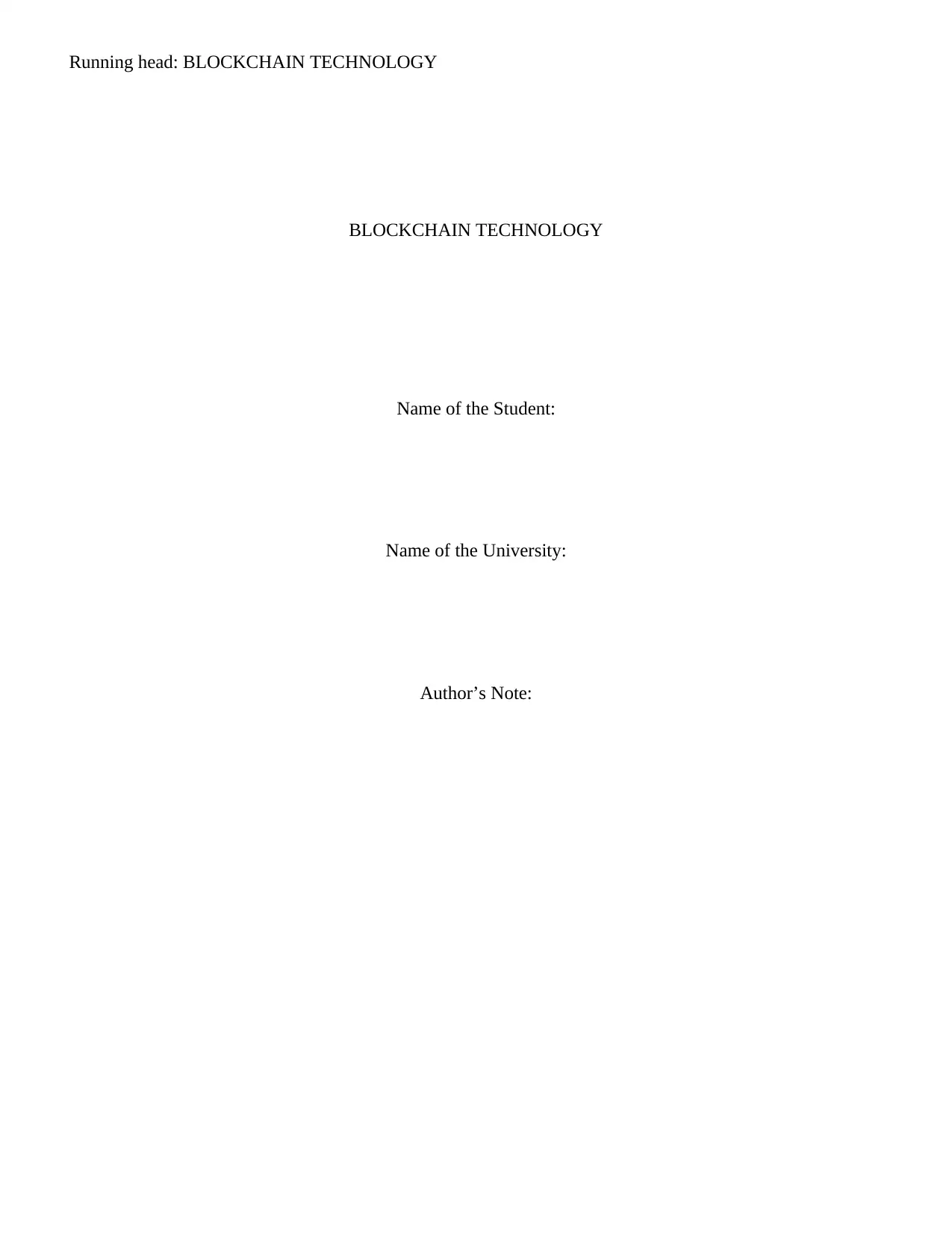
Running head: BLOCKCHAIN TECHNOLOGY
BLOCKCHAIN TECHNOLOGY
Name of the Student:
Name of the University:
Author’s Note:
BLOCKCHAIN TECHNOLOGY
Name of the Student:
Name of the University:
Author’s Note:
Paraphrase This Document
Need a fresh take? Get an instant paraphrase of this document with our AI Paraphraser
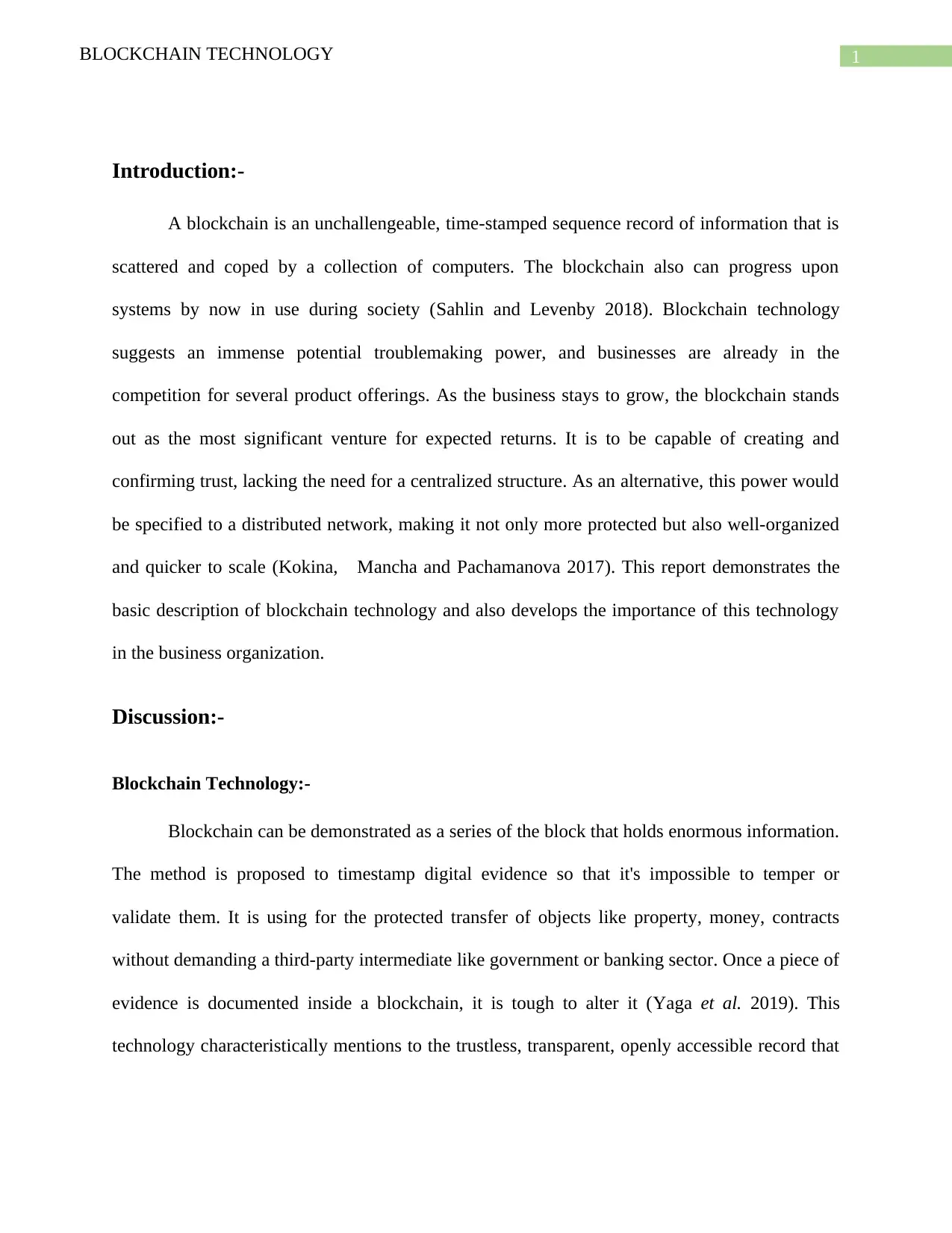
1BLOCKCHAIN TECHNOLOGY
Introduction:-
A blockchain is an unchallengeable, time-stamped sequence record of information that is
scattered and coped by a collection of computers. The blockchain also can progress upon
systems by now in use during society (Sahlin and Levenby 2018). Blockchain technology
suggests an immense potential troublemaking power, and businesses are already in the
competition for several product offerings. As the business stays to grow, the blockchain stands
out as the most significant venture for expected returns. It is to be capable of creating and
confirming trust, lacking the need for a centralized structure. As an alternative, this power would
be specified to a distributed network, making it not only more protected but also well-organized
and quicker to scale (Kokina, Mancha and Pachamanova 2017). This report demonstrates the
basic description of blockchain technology and also develops the importance of this technology
in the business organization.
Discussion:-
Blockchain Technology:-
Blockchain can be demonstrated as a series of the block that holds enormous information.
The method is proposed to timestamp digital evidence so that it's impossible to temper or
validate them. It is using for the protected transfer of objects like property, money, contracts
without demanding a third-party intermediate like government or banking sector. Once a piece of
evidence is documented inside a blockchain, it is tough to alter it (Yaga et al. 2019). This
technology characteristically mentions to the trustless, transparent, openly accessible record that
Introduction:-
A blockchain is an unchallengeable, time-stamped sequence record of information that is
scattered and coped by a collection of computers. The blockchain also can progress upon
systems by now in use during society (Sahlin and Levenby 2018). Blockchain technology
suggests an immense potential troublemaking power, and businesses are already in the
competition for several product offerings. As the business stays to grow, the blockchain stands
out as the most significant venture for expected returns. It is to be capable of creating and
confirming trust, lacking the need for a centralized structure. As an alternative, this power would
be specified to a distributed network, making it not only more protected but also well-organized
and quicker to scale (Kokina, Mancha and Pachamanova 2017). This report demonstrates the
basic description of blockchain technology and also develops the importance of this technology
in the business organization.
Discussion:-
Blockchain Technology:-
Blockchain can be demonstrated as a series of the block that holds enormous information.
The method is proposed to timestamp digital evidence so that it's impossible to temper or
validate them. It is using for the protected transfer of objects like property, money, contracts
without demanding a third-party intermediate like government or banking sector. Once a piece of
evidence is documented inside a blockchain, it is tough to alter it (Yaga et al. 2019). This
technology characteristically mentions to the trustless, transparent, openly accessible record that
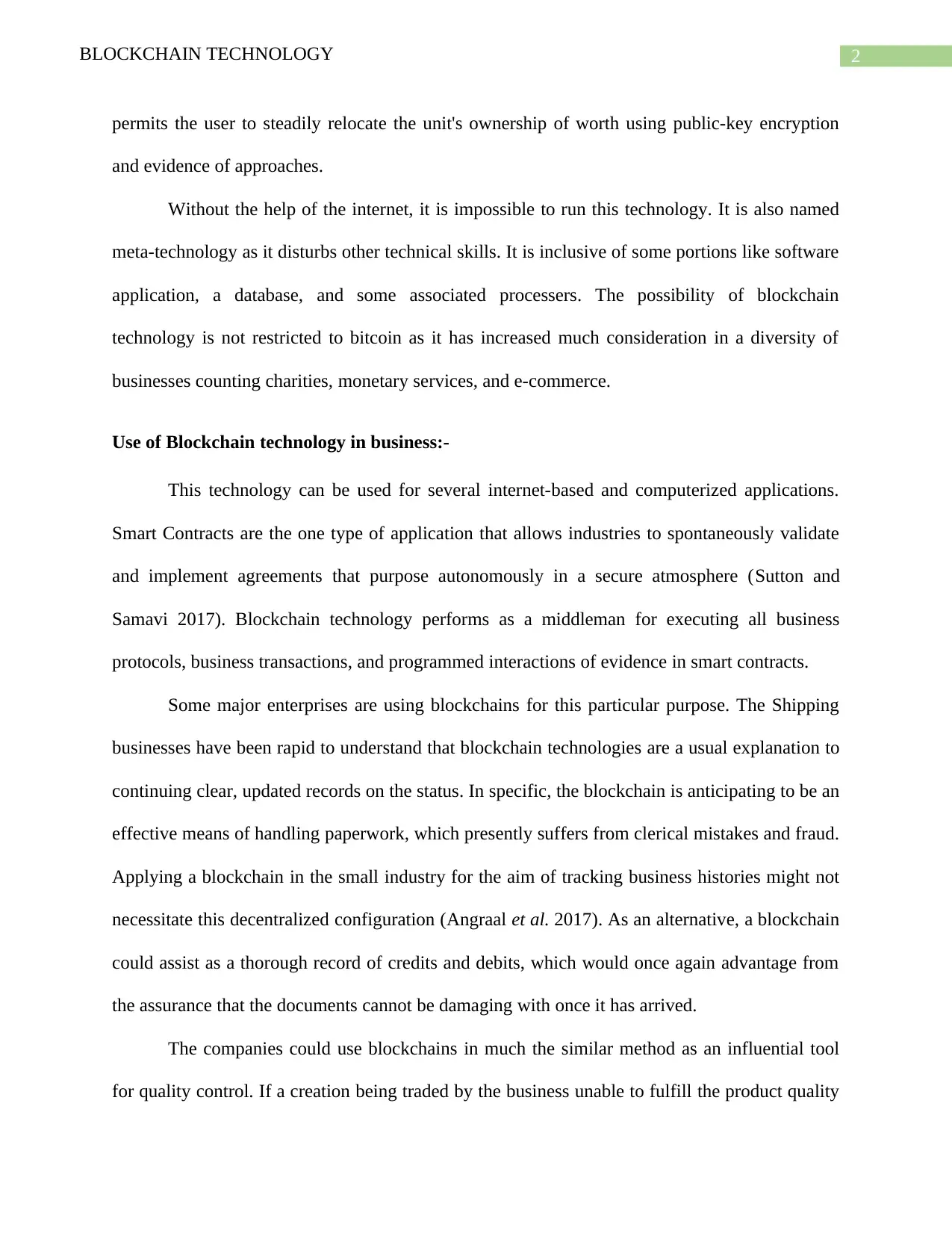
2BLOCKCHAIN TECHNOLOGY
permits the user to steadily relocate the unit's ownership of worth using public-key encryption
and evidence of approaches.
Without the help of the internet, it is impossible to run this technology. It is also named
meta-technology as it disturbs other technical skills. It is inclusive of some portions like software
application, a database, and some associated processers. The possibility of blockchain
technology is not restricted to bitcoin as it has increased much consideration in a diversity of
businesses counting charities, monetary services, and e-commerce.
Use of Blockchain technology in business:-
This technology can be used for several internet-based and computerized applications.
Smart Contracts are the one type of application that allows industries to spontaneously validate
and implement agreements that purpose autonomously in a secure atmosphere (Sutton and
Samavi 2017). Blockchain technology performs as a middleman for executing all business
protocols, business transactions, and programmed interactions of evidence in smart contracts.
Some major enterprises are using blockchains for this particular purpose. The Shipping
businesses have been rapid to understand that blockchain technologies are a usual explanation to
continuing clear, updated records on the status. In specific, the blockchain is anticipating to be an
effective means of handling paperwork, which presently suffers from clerical mistakes and fraud.
Applying a blockchain in the small industry for the aim of tracking business histories might not
necessitate this decentralized configuration (Angraal et al. 2017). As an alternative, a blockchain
could assist as a thorough record of credits and debits, which would once again advantage from
the assurance that the documents cannot be damaging with once it has arrived.
The companies could use blockchains in much the similar method as an influential tool
for quality control. If a creation being traded by the business unable to fulfill the product quality
permits the user to steadily relocate the unit's ownership of worth using public-key encryption
and evidence of approaches.
Without the help of the internet, it is impossible to run this technology. It is also named
meta-technology as it disturbs other technical skills. It is inclusive of some portions like software
application, a database, and some associated processers. The possibility of blockchain
technology is not restricted to bitcoin as it has increased much consideration in a diversity of
businesses counting charities, monetary services, and e-commerce.
Use of Blockchain technology in business:-
This technology can be used for several internet-based and computerized applications.
Smart Contracts are the one type of application that allows industries to spontaneously validate
and implement agreements that purpose autonomously in a secure atmosphere (Sutton and
Samavi 2017). Blockchain technology performs as a middleman for executing all business
protocols, business transactions, and programmed interactions of evidence in smart contracts.
Some major enterprises are using blockchains for this particular purpose. The Shipping
businesses have been rapid to understand that blockchain technologies are a usual explanation to
continuing clear, updated records on the status. In specific, the blockchain is anticipating to be an
effective means of handling paperwork, which presently suffers from clerical mistakes and fraud.
Applying a blockchain in the small industry for the aim of tracking business histories might not
necessitate this decentralized configuration (Angraal et al. 2017). As an alternative, a blockchain
could assist as a thorough record of credits and debits, which would once again advantage from
the assurance that the documents cannot be damaging with once it has arrived.
The companies could use blockchains in much the similar method as an influential tool
for quality control. If a creation being traded by the business unable to fulfill the product quality
⊘ This is a preview!⊘
Do you want full access?
Subscribe today to unlock all pages.

Trusted by 1+ million students worldwide
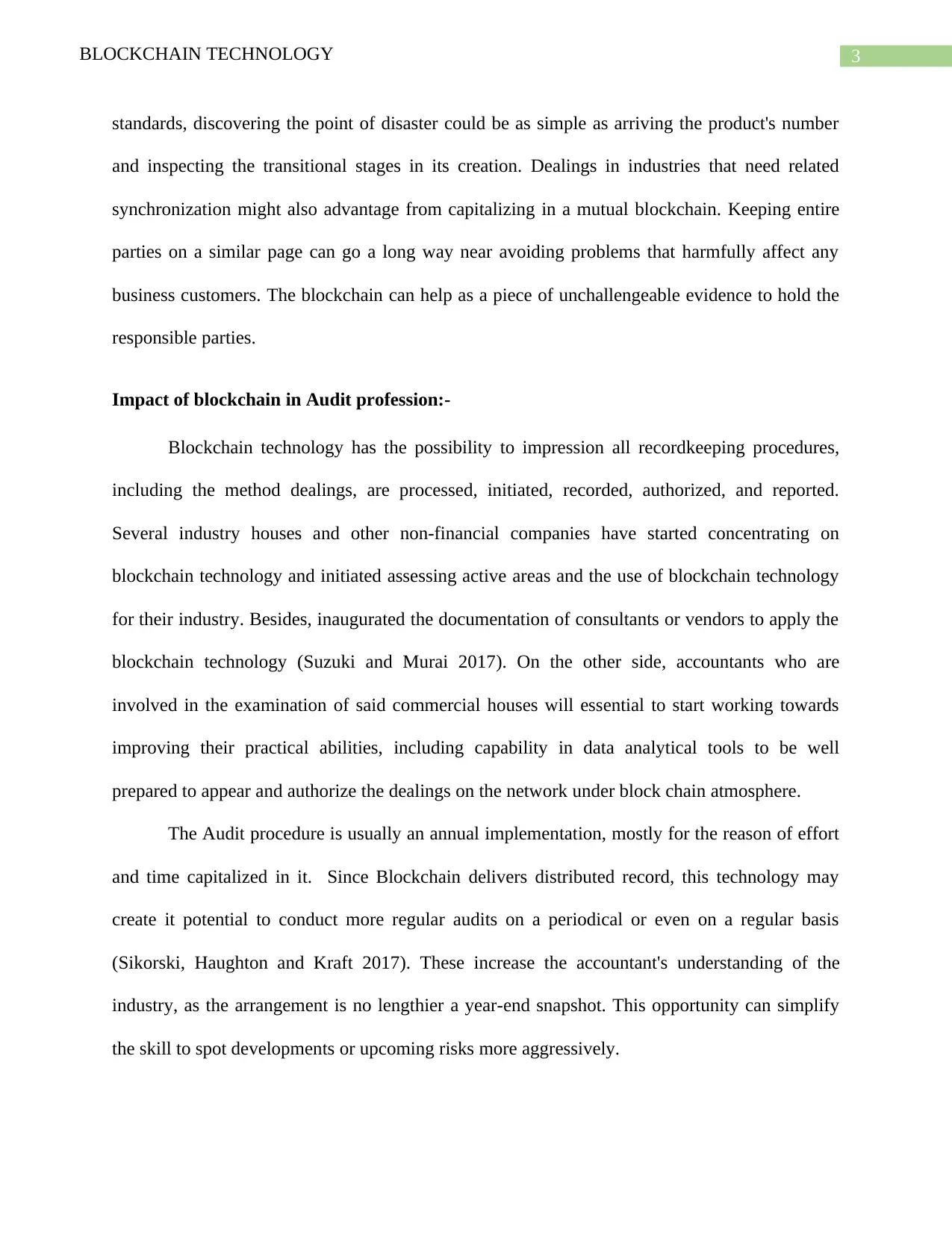
3BLOCKCHAIN TECHNOLOGY
standards, discovering the point of disaster could be as simple as arriving the product's number
and inspecting the transitional stages in its creation. Dealings in industries that need related
synchronization might also advantage from capitalizing in a mutual blockchain. Keeping entire
parties on a similar page can go a long way near avoiding problems that harmfully affect any
business customers. The blockchain can help as a piece of unchallengeable evidence to hold the
responsible parties.
Impact of blockchain in Audit profession:-
Blockchain technology has the possibility to impression all recordkeeping procedures,
including the method dealings, are processed, initiated, recorded, authorized, and reported.
Several industry houses and other non-financial companies have started concentrating on
blockchain technology and initiated assessing active areas and the use of blockchain technology
for their industry. Besides, inaugurated the documentation of consultants or vendors to apply the
blockchain technology (Suzuki and Murai 2017). On the other side, accountants who are
involved in the examination of said commercial houses will essential to start working towards
improving their practical abilities, including capability in data analytical tools to be well
prepared to appear and authorize the dealings on the network under block chain atmosphere.
The Audit procedure is usually an annual implementation, mostly for the reason of effort
and time capitalized in it. Since Blockchain delivers distributed record, this technology may
create it potential to conduct more regular audits on a periodical or even on a regular basis
(Sikorski, Haughton and Kraft 2017). These increase the accountant's understanding of the
industry, as the arrangement is no lengthier a year-end snapshot. This opportunity can simplify
the skill to spot developments or upcoming risks more aggressively.
standards, discovering the point of disaster could be as simple as arriving the product's number
and inspecting the transitional stages in its creation. Dealings in industries that need related
synchronization might also advantage from capitalizing in a mutual blockchain. Keeping entire
parties on a similar page can go a long way near avoiding problems that harmfully affect any
business customers. The blockchain can help as a piece of unchallengeable evidence to hold the
responsible parties.
Impact of blockchain in Audit profession:-
Blockchain technology has the possibility to impression all recordkeeping procedures,
including the method dealings, are processed, initiated, recorded, authorized, and reported.
Several industry houses and other non-financial companies have started concentrating on
blockchain technology and initiated assessing active areas and the use of blockchain technology
for their industry. Besides, inaugurated the documentation of consultants or vendors to apply the
blockchain technology (Suzuki and Murai 2017). On the other side, accountants who are
involved in the examination of said commercial houses will essential to start working towards
improving their practical abilities, including capability in data analytical tools to be well
prepared to appear and authorize the dealings on the network under block chain atmosphere.
The Audit procedure is usually an annual implementation, mostly for the reason of effort
and time capitalized in it. Since Blockchain delivers distributed record, this technology may
create it potential to conduct more regular audits on a periodical or even on a regular basis
(Sikorski, Haughton and Kraft 2017). These increase the accountant's understanding of the
industry, as the arrangement is no lengthier a year-end snapshot. This opportunity can simplify
the skill to spot developments or upcoming risks more aggressively.
Paraphrase This Document
Need a fresh take? Get an instant paraphrase of this document with our AI Paraphraser
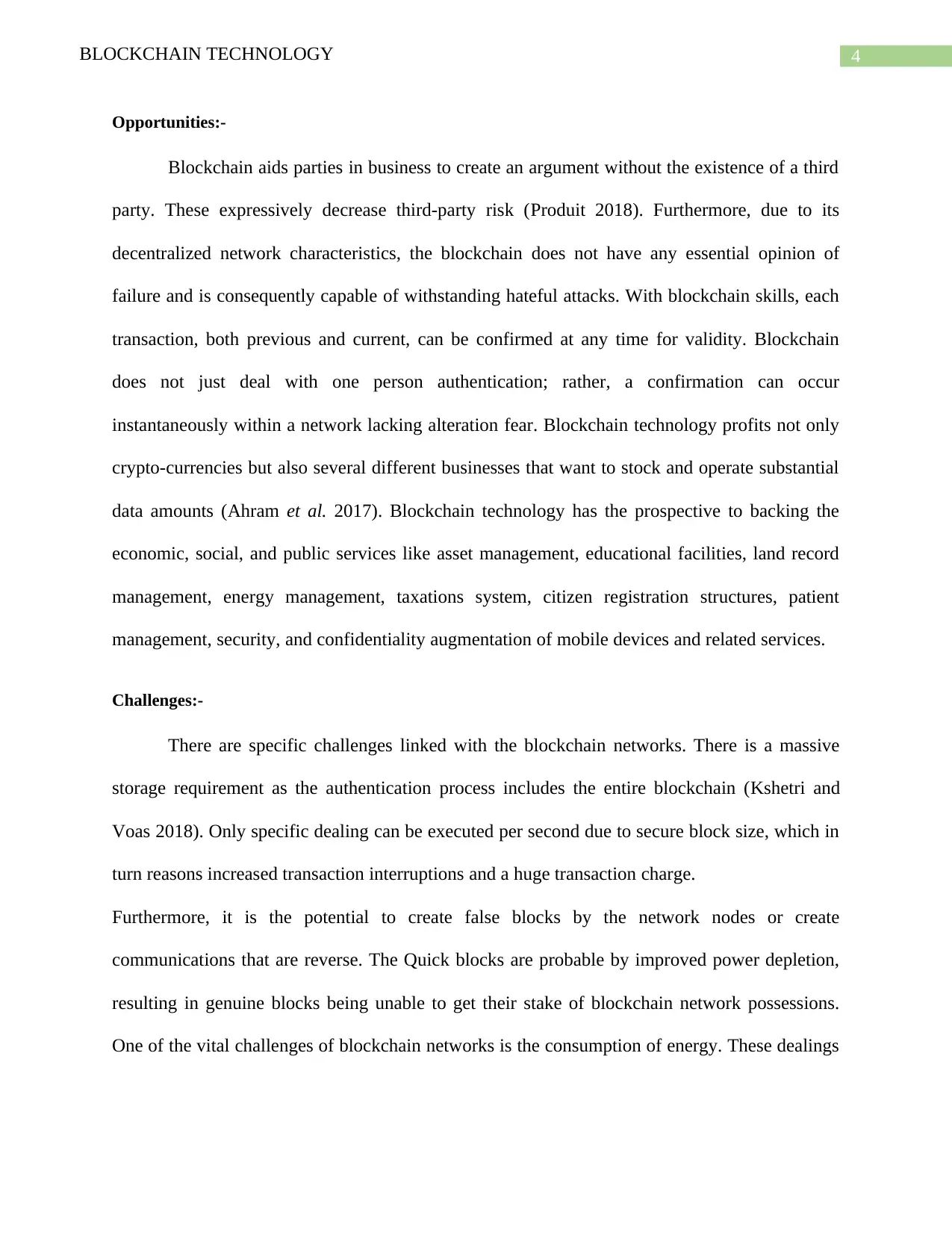
4BLOCKCHAIN TECHNOLOGY
Opportunities:-
Blockchain aids parties in business to create an argument without the existence of a third
party. These expressively decrease third-party risk (Produit 2018). Furthermore, due to its
decentralized network characteristics, the blockchain does not have any essential opinion of
failure and is consequently capable of withstanding hateful attacks. With blockchain skills, each
transaction, both previous and current, can be confirmed at any time for validity. Blockchain
does not just deal with one person authentication; rather, a confirmation can occur
instantaneously within a network lacking alteration fear. Blockchain technology profits not only
crypto-currencies but also several different businesses that want to stock and operate substantial
data amounts (Ahram et al. 2017). Blockchain technology has the prospective to backing the
economic, social, and public services like asset management, educational facilities, land record
management, energy management, taxations system, citizen registration structures, patient
management, security, and confidentiality augmentation of mobile devices and related services.
Challenges:-
There are specific challenges linked with the blockchain networks. There is a massive
storage requirement as the authentication process includes the entire blockchain (Kshetri and
Voas 2018). Only specific dealing can be executed per second due to secure block size, which in
turn reasons increased transaction interruptions and a huge transaction charge.
Furthermore, it is the potential to create false blocks by the network nodes or create
communications that are reverse. The Quick blocks are probable by improved power depletion,
resulting in genuine blocks being unable to get their stake of blockchain network possessions.
One of the vital challenges of blockchain networks is the consumption of energy. These dealings
Opportunities:-
Blockchain aids parties in business to create an argument without the existence of a third
party. These expressively decrease third-party risk (Produit 2018). Furthermore, due to its
decentralized network characteristics, the blockchain does not have any essential opinion of
failure and is consequently capable of withstanding hateful attacks. With blockchain skills, each
transaction, both previous and current, can be confirmed at any time for validity. Blockchain
does not just deal with one person authentication; rather, a confirmation can occur
instantaneously within a network lacking alteration fear. Blockchain technology profits not only
crypto-currencies but also several different businesses that want to stock and operate substantial
data amounts (Ahram et al. 2017). Blockchain technology has the prospective to backing the
economic, social, and public services like asset management, educational facilities, land record
management, energy management, taxations system, citizen registration structures, patient
management, security, and confidentiality augmentation of mobile devices and related services.
Challenges:-
There are specific challenges linked with the blockchain networks. There is a massive
storage requirement as the authentication process includes the entire blockchain (Kshetri and
Voas 2018). Only specific dealing can be executed per second due to secure block size, which in
turn reasons increased transaction interruptions and a huge transaction charge.
Furthermore, it is the potential to create false blocks by the network nodes or create
communications that are reverse. The Quick blocks are probable by improved power depletion,
resulting in genuine blocks being unable to get their stake of blockchain network possessions.
One of the vital challenges of blockchain networks is the consumption of energy. These dealings
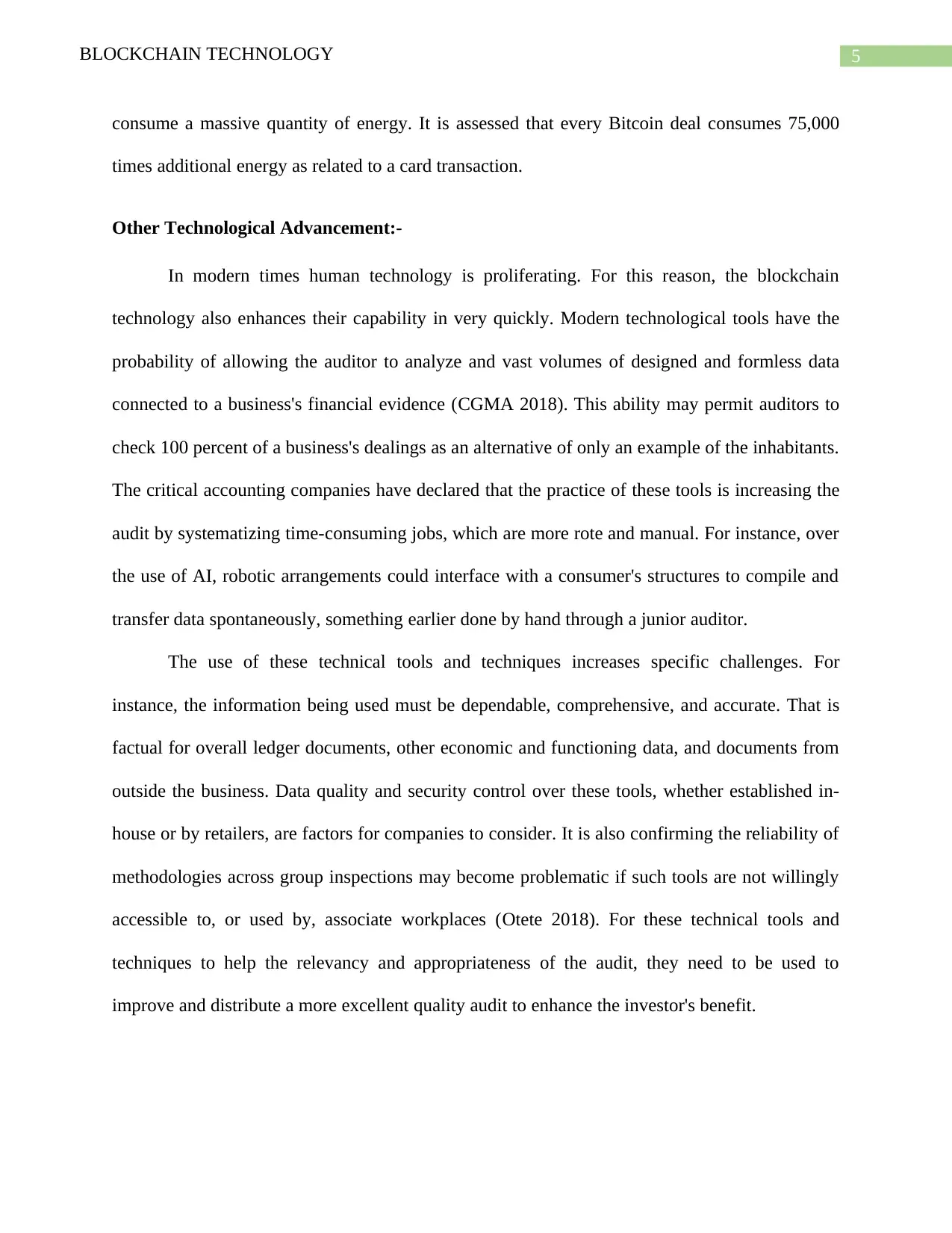
5BLOCKCHAIN TECHNOLOGY
consume a massive quantity of energy. It is assessed that every Bitcoin deal consumes 75,000
times additional energy as related to a card transaction.
Other Technological Advancement:-
In modern times human technology is proliferating. For this reason, the blockchain
technology also enhances their capability in very quickly. Modern technological tools have the
probability of allowing the auditor to analyze and vast volumes of designed and formless data
connected to a business's financial evidence (CGMA 2018). This ability may permit auditors to
check 100 percent of a business's dealings as an alternative of only an example of the inhabitants.
The critical accounting companies have declared that the practice of these tools is increasing the
audit by systematizing time-consuming jobs, which are more rote and manual. For instance, over
the use of AI, robotic arrangements could interface with a consumer's structures to compile and
transfer data spontaneously, something earlier done by hand through a junior auditor.
The use of these technical tools and techniques increases specific challenges. For
instance, the information being used must be dependable, comprehensive, and accurate. That is
factual for overall ledger documents, other economic and functioning data, and documents from
outside the business. Data quality and security control over these tools, whether established in-
house or by retailers, are factors for companies to consider. It is also confirming the reliability of
methodologies across group inspections may become problematic if such tools are not willingly
accessible to, or used by, associate workplaces (Otete 2018). For these technical tools and
techniques to help the relevancy and appropriateness of the audit, they need to be used to
improve and distribute a more excellent quality audit to enhance the investor's benefit.
consume a massive quantity of energy. It is assessed that every Bitcoin deal consumes 75,000
times additional energy as related to a card transaction.
Other Technological Advancement:-
In modern times human technology is proliferating. For this reason, the blockchain
technology also enhances their capability in very quickly. Modern technological tools have the
probability of allowing the auditor to analyze and vast volumes of designed and formless data
connected to a business's financial evidence (CGMA 2018). This ability may permit auditors to
check 100 percent of a business's dealings as an alternative of only an example of the inhabitants.
The critical accounting companies have declared that the practice of these tools is increasing the
audit by systematizing time-consuming jobs, which are more rote and manual. For instance, over
the use of AI, robotic arrangements could interface with a consumer's structures to compile and
transfer data spontaneously, something earlier done by hand through a junior auditor.
The use of these technical tools and techniques increases specific challenges. For
instance, the information being used must be dependable, comprehensive, and accurate. That is
factual for overall ledger documents, other economic and functioning data, and documents from
outside the business. Data quality and security control over these tools, whether established in-
house or by retailers, are factors for companies to consider. It is also confirming the reliability of
methodologies across group inspections may become problematic if such tools are not willingly
accessible to, or used by, associate workplaces (Otete 2018). For these technical tools and
techniques to help the relevancy and appropriateness of the audit, they need to be used to
improve and distribute a more excellent quality audit to enhance the investor's benefit.
⊘ This is a preview!⊘
Do you want full access?
Subscribe today to unlock all pages.

Trusted by 1+ million students worldwide
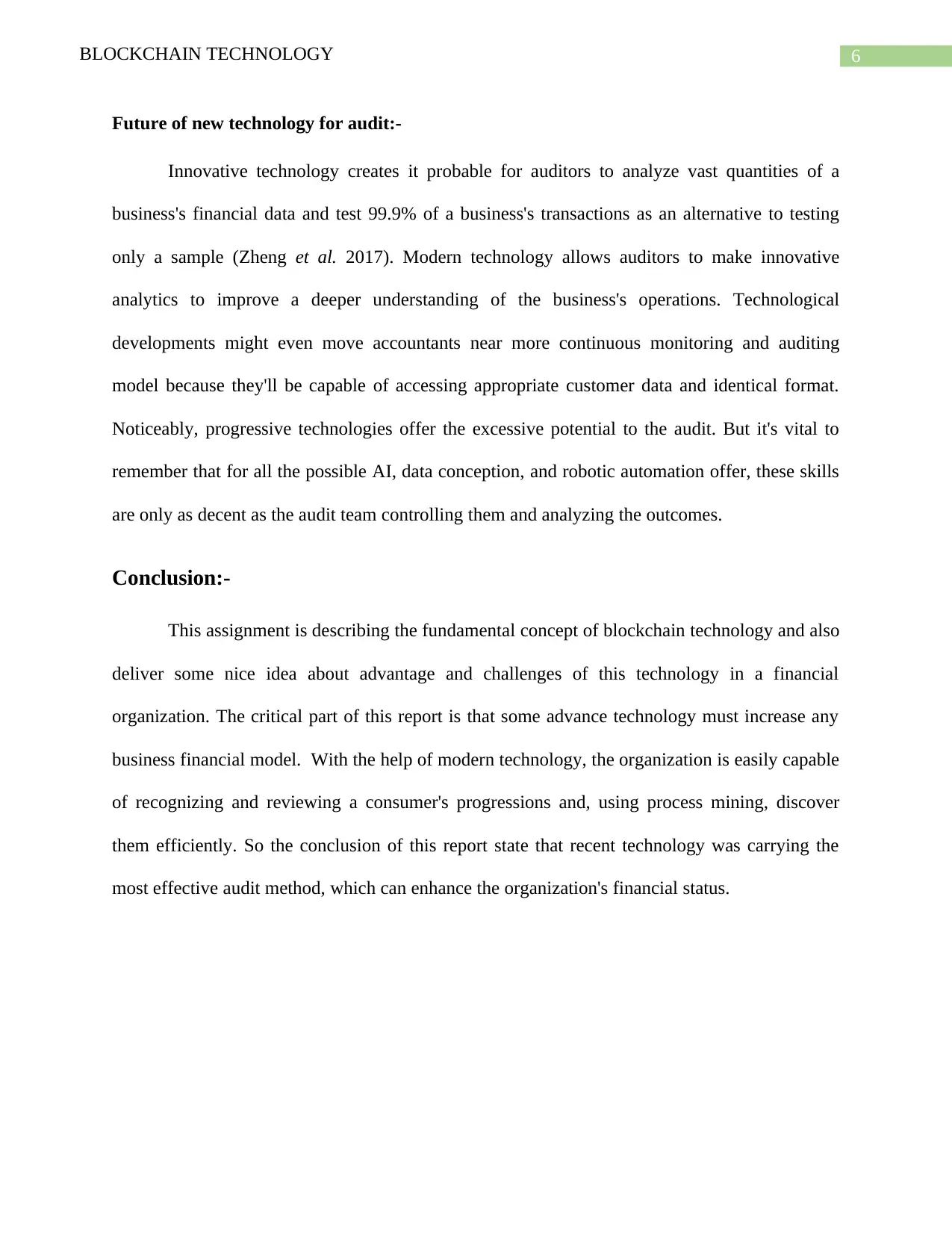
6BLOCKCHAIN TECHNOLOGY
Future of new technology for audit:-
Innovative technology creates it probable for auditors to analyze vast quantities of a
business's financial data and test 99.9% of a business's transactions as an alternative to testing
only a sample (Zheng et al. 2017). Modern technology allows auditors to make innovative
analytics to improve a deeper understanding of the business's operations. Technological
developments might even move accountants near more continuous monitoring and auditing
model because they'll be capable of accessing appropriate customer data and identical format.
Noticeably, progressive technologies offer the excessive potential to the audit. But it's vital to
remember that for all the possible AI, data conception, and robotic automation offer, these skills
are only as decent as the audit team controlling them and analyzing the outcomes.
Conclusion:-
This assignment is describing the fundamental concept of blockchain technology and also
deliver some nice idea about advantage and challenges of this technology in a financial
organization. The critical part of this report is that some advance technology must increase any
business financial model. With the help of modern technology, the organization is easily capable
of recognizing and reviewing a consumer's progressions and, using process mining, discover
them efficiently. So the conclusion of this report state that recent technology was carrying the
most effective audit method, which can enhance the organization's financial status.
Future of new technology for audit:-
Innovative technology creates it probable for auditors to analyze vast quantities of a
business's financial data and test 99.9% of a business's transactions as an alternative to testing
only a sample (Zheng et al. 2017). Modern technology allows auditors to make innovative
analytics to improve a deeper understanding of the business's operations. Technological
developments might even move accountants near more continuous monitoring and auditing
model because they'll be capable of accessing appropriate customer data and identical format.
Noticeably, progressive technologies offer the excessive potential to the audit. But it's vital to
remember that for all the possible AI, data conception, and robotic automation offer, these skills
are only as decent as the audit team controlling them and analyzing the outcomes.
Conclusion:-
This assignment is describing the fundamental concept of blockchain technology and also
deliver some nice idea about advantage and challenges of this technology in a financial
organization. The critical part of this report is that some advance technology must increase any
business financial model. With the help of modern technology, the organization is easily capable
of recognizing and reviewing a consumer's progressions and, using process mining, discover
them efficiently. So the conclusion of this report state that recent technology was carrying the
most effective audit method, which can enhance the organization's financial status.
Paraphrase This Document
Need a fresh take? Get an instant paraphrase of this document with our AI Paraphraser
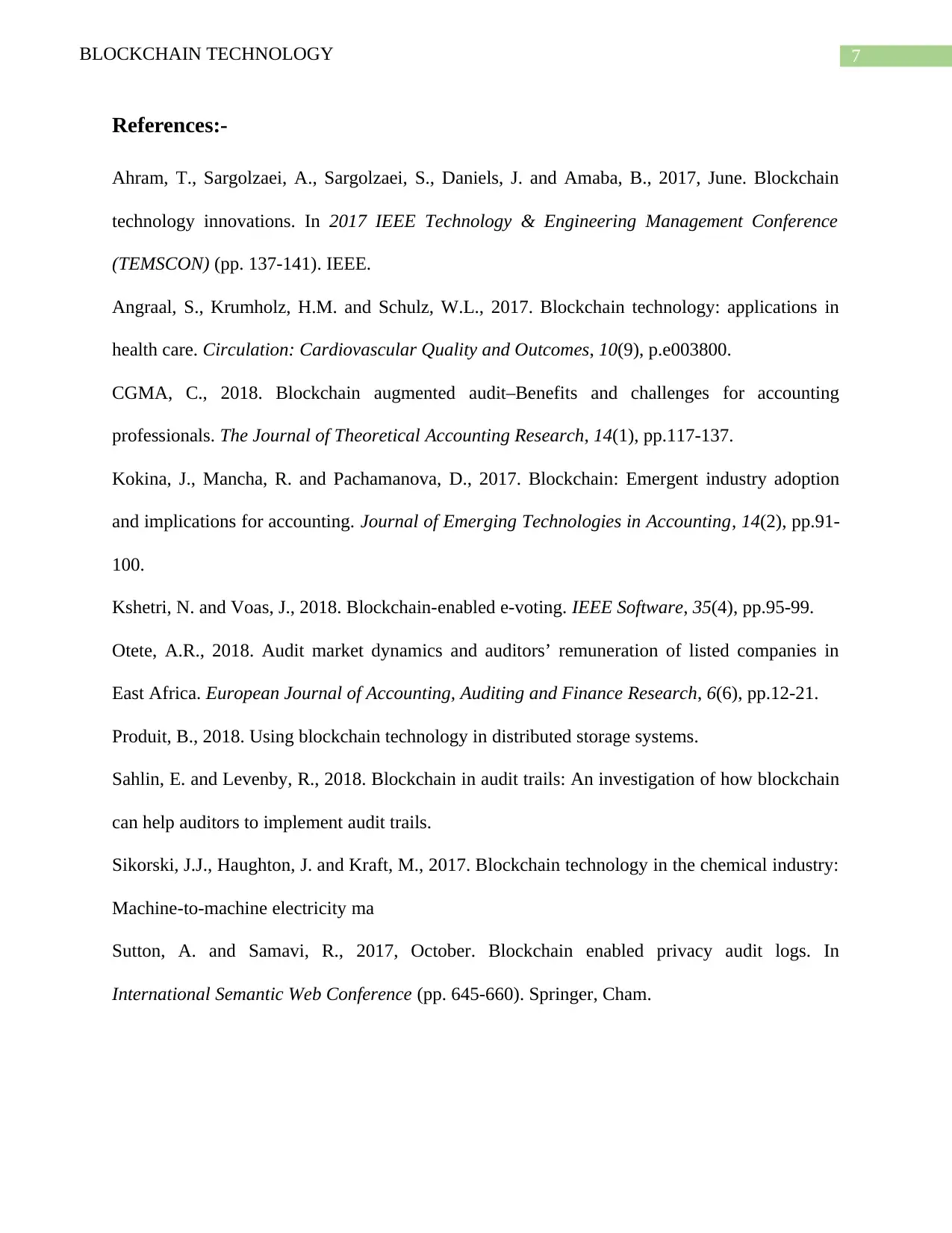
7BLOCKCHAIN TECHNOLOGY
References:-
Ahram, T., Sargolzaei, A., Sargolzaei, S., Daniels, J. and Amaba, B., 2017, June. Blockchain
technology innovations. In 2017 IEEE Technology & Engineering Management Conference
(TEMSCON) (pp. 137-141). IEEE.
Angraal, S., Krumholz, H.M. and Schulz, W.L., 2017. Blockchain technology: applications in
health care. Circulation: Cardiovascular Quality and Outcomes, 10(9), p.e003800.
CGMA, C., 2018. Blockchain augmented audit–Benefits and challenges for accounting
professionals. The Journal of Theoretical Accounting Research, 14(1), pp.117-137.
Kokina, J., Mancha, R. and Pachamanova, D., 2017. Blockchain: Emergent industry adoption
and implications for accounting. Journal of Emerging Technologies in Accounting, 14(2), pp.91-
100.
Kshetri, N. and Voas, J., 2018. Blockchain-enabled e-voting. IEEE Software, 35(4), pp.95-99.
Otete, A.R., 2018. Audit market dynamics and auditors’ remuneration of listed companies in
East Africa. European Journal of Accounting, Auditing and Finance Research, 6(6), pp.12-21.
Produit, B., 2018. Using blockchain technology in distributed storage systems.
Sahlin, E. and Levenby, R., 2018. Blockchain in audit trails: An investigation of how blockchain
can help auditors to implement audit trails.
Sikorski, J.J., Haughton, J. and Kraft, M., 2017. Blockchain technology in the chemical industry:
Machine-to-machine electricity ma
Sutton, A. and Samavi, R., 2017, October. Blockchain enabled privacy audit logs. In
International Semantic Web Conference (pp. 645-660). Springer, Cham.
References:-
Ahram, T., Sargolzaei, A., Sargolzaei, S., Daniels, J. and Amaba, B., 2017, June. Blockchain
technology innovations. In 2017 IEEE Technology & Engineering Management Conference
(TEMSCON) (pp. 137-141). IEEE.
Angraal, S., Krumholz, H.M. and Schulz, W.L., 2017. Blockchain technology: applications in
health care. Circulation: Cardiovascular Quality and Outcomes, 10(9), p.e003800.
CGMA, C., 2018. Blockchain augmented audit–Benefits and challenges for accounting
professionals. The Journal of Theoretical Accounting Research, 14(1), pp.117-137.
Kokina, J., Mancha, R. and Pachamanova, D., 2017. Blockchain: Emergent industry adoption
and implications for accounting. Journal of Emerging Technologies in Accounting, 14(2), pp.91-
100.
Kshetri, N. and Voas, J., 2018. Blockchain-enabled e-voting. IEEE Software, 35(4), pp.95-99.
Otete, A.R., 2018. Audit market dynamics and auditors’ remuneration of listed companies in
East Africa. European Journal of Accounting, Auditing and Finance Research, 6(6), pp.12-21.
Produit, B., 2018. Using blockchain technology in distributed storage systems.
Sahlin, E. and Levenby, R., 2018. Blockchain in audit trails: An investigation of how blockchain
can help auditors to implement audit trails.
Sikorski, J.J., Haughton, J. and Kraft, M., 2017. Blockchain technology in the chemical industry:
Machine-to-machine electricity ma
Sutton, A. and Samavi, R., 2017, October. Blockchain enabled privacy audit logs. In
International Semantic Web Conference (pp. 645-660). Springer, Cham.
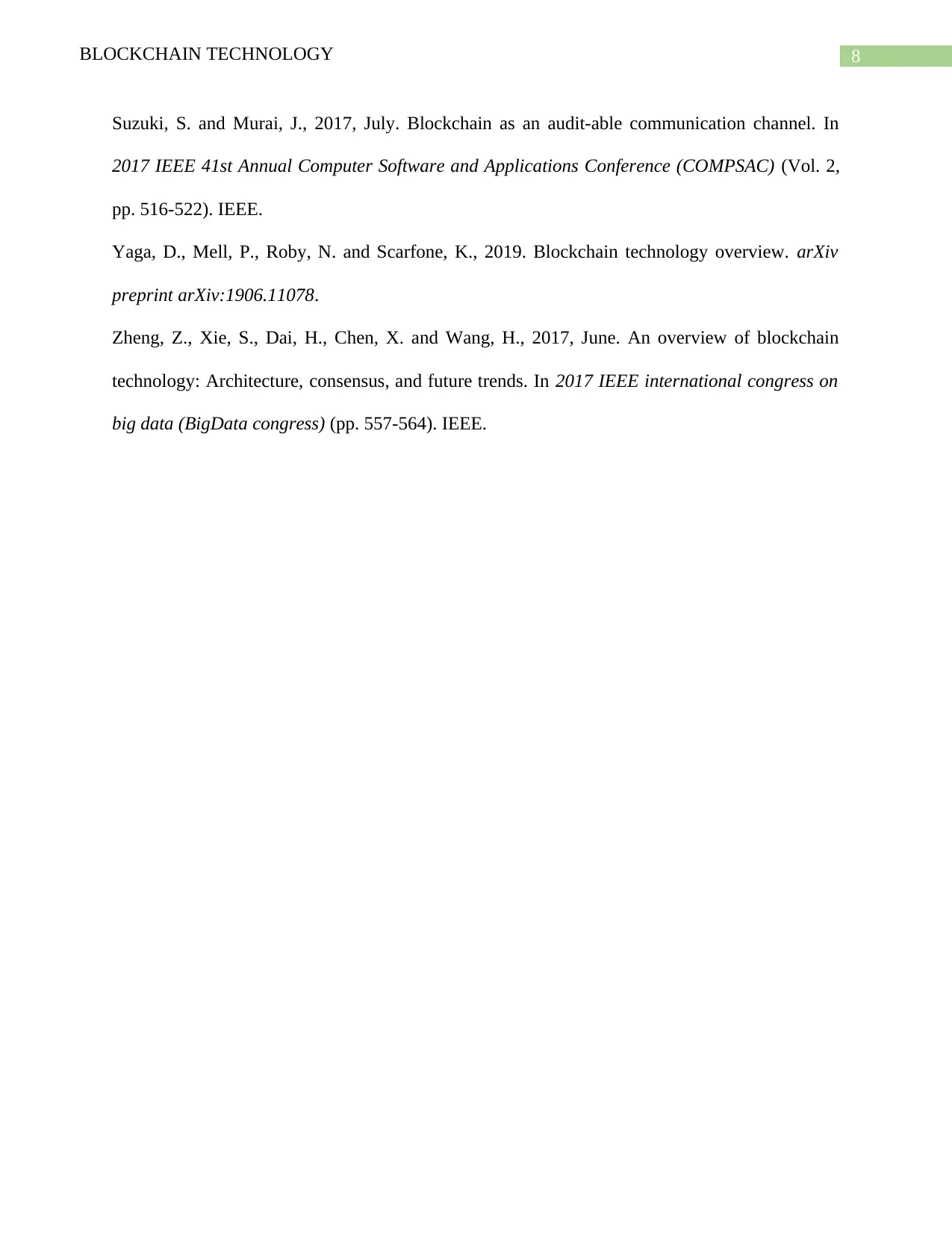
8BLOCKCHAIN TECHNOLOGY
Suzuki, S. and Murai, J., 2017, July. Blockchain as an audit-able communication channel. In
2017 IEEE 41st Annual Computer Software and Applications Conference (COMPSAC) (Vol. 2,
pp. 516-522). IEEE.
Yaga, D., Mell, P., Roby, N. and Scarfone, K., 2019. Blockchain technology overview. arXiv
preprint arXiv:1906.11078.
Zheng, Z., Xie, S., Dai, H., Chen, X. and Wang, H., 2017, June. An overview of blockchain
technology: Architecture, consensus, and future trends. In 2017 IEEE international congress on
big data (BigData congress) (pp. 557-564). IEEE.
Suzuki, S. and Murai, J., 2017, July. Blockchain as an audit-able communication channel. In
2017 IEEE 41st Annual Computer Software and Applications Conference (COMPSAC) (Vol. 2,
pp. 516-522). IEEE.
Yaga, D., Mell, P., Roby, N. and Scarfone, K., 2019. Blockchain technology overview. arXiv
preprint arXiv:1906.11078.
Zheng, Z., Xie, S., Dai, H., Chen, X. and Wang, H., 2017, June. An overview of blockchain
technology: Architecture, consensus, and future trends. In 2017 IEEE international congress on
big data (BigData congress) (pp. 557-564). IEEE.
⊘ This is a preview!⊘
Do you want full access?
Subscribe today to unlock all pages.

Trusted by 1+ million students worldwide
1 out of 9
Related Documents
Your All-in-One AI-Powered Toolkit for Academic Success.
+13062052269
info@desklib.com
Available 24*7 on WhatsApp / Email
![[object Object]](/_next/static/media/star-bottom.7253800d.svg)
Unlock your academic potential
Copyright © 2020–2026 A2Z Services. All Rights Reserved. Developed and managed by ZUCOL.




